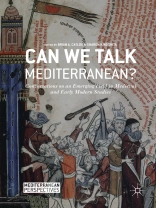This book provides a systematic framework for the emerging field of Mediterranean studies, collecting essays from scholars of history, literature, religion, and art history that seek a more fluid understanding of “Mediterranean.” It emphasizes the interdependence of Mediterranean regions and the rich interaction (both peaceful and bellicose, at sea and on land) between them. It avoids applying the national, cultural and ethnic categories that developed with the post-Enlightenment domination of northwestern Europe over the academy, working instead towards a dynamic and thoroughly interdisciplinary picture of the Mediterranean. Including an extensive bibliography and a conversation between leading scholars in the field, Can We Talk Mediterranean? lays the groundwork for a new critical and conceptual approach to the region.
Jadual kandungan
1. Why the Mediterranean?.- 2. The Thalassal Optic.- 3. Negotiating the Corrupting Sea: Literature ‘in’ and ‘of’ the Medieval Mediterranean.- 4. Desiderata for the Study of Early Modern Art of the Mediterranean.- 5. The Maritime, the Ecological, the Cultural—and the Fig Leaf: Prospects for Medieval Mediterranean Studies.- 6. Beneath the Surface: Responses and Queries.- 7. Reflections: Talking Mediterranean.- 8. Further Reading.
Mengenai Pengarang
Brian A. Catlos is Professor of Religious Studies at the University of Colorado at Boulder and Research Associate in Humanities at the University of California, Santa Cruz, USA. He is the award-winning author of The Victors and the Vanquished: Christians and Muslims of Catalonia and Aragon, 1050-1300; Muslims of Medieval Latin Christendom; and Infidel Kings and Holy Warriors.
Sharon Kinoshita is Professor of Literature at the University of California, Santa Cruz, USA, specializing in Medieval French Literature, Mediterranean Studies, and the Global Middle Ages. She is the author of Medieval Boundaries: Rethinking Difference in Old French Literature and co-editor of the Blackwell Companion to Mediterranean History.












